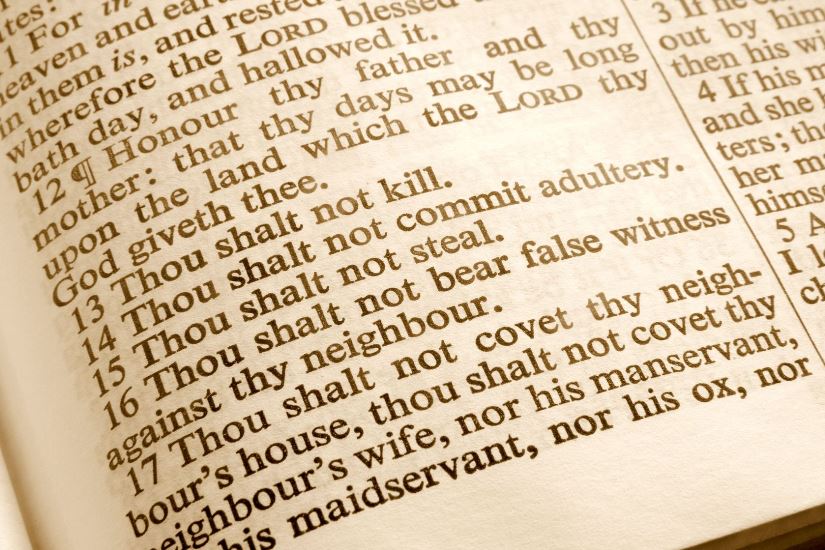The concept of “legalism” is at the heart of the current Catholic discussion of marriage, mercy, and morality. Pope Francis has suggested that critics of his Apostolic Exhortation Amoris Laetitia are approaching the document from a “legalistic” mindset. This criticism is repeated often by his supporters. It is worth getting clear on what this term really means in order to determine whether it is accurately applied to critics of Amoris or whether, as I think, it in fact characterizes some of its defenders.
A common understanding of legalism certainly seems to make sense of the antagonism to “law” found in supporters of Amoris Laetitia and possibly in Amoris itself. In this view, the legalist is a stickler for rules: he is rigorist and is inclined to forget the “spirit” of the law in favor of its “letter.” Thus, the anti-legalist spirit is marked by a rejection of those rules, by a push for empathy, discernment, accompaniment, sensitivity to the particular, and the like. Rules are associated with Pharisaism, and a rhetorically helpful device is thus available to make legalism seem particularly un-Christlike.
Understanding legalism in this way makes it easy to see how a particular intellectual moment in Catholic moral theology arose and gained widespread acceptance in the 1960s: proportionalism. Proportionalism is best understood as a species of consequentialism, the view that the fundamental norm for morality is that one should bring about the greatest good for the greatest number. Proportionalists spoke, and continue to speak, of “pre-moral” goods to which the appropriately loving response was one of maximization. St. John Paul II famously subjected proportionalism to extensive critique in his encyclical Veritatis Splendor.
Proportionalism emerged in part as a response to the “science of morals” approach that could be found in Catholic moral theology prior to the 1960s, an approach that relied on “moral manuals” that were written in part for priests to help in their pastoral care of sinners, especially in the confessional. The manual approach did indeed emphasize the importance, and perhaps pervasiveness, of rules in the moral life.
Start your day with Public Discourse
Sign up and get our daily essays sent straight to your inbox.Certainly, the manualists affirmed the existence of moral absolutes, of rules that identify actions that are intrinsically impermissible and never to be done. But proportionalism, like consequentialism, finds it impossible (and undesirable) to affirm the existence of such rules or acts, for it can never be asserted in advance that the consequences of some particular action will always be the worst of all possible options. Amoris suggests to some readers a similar view in its claim that “general rules set forth a good which can never be disregarded or neglected, but in their formulation they cannot provide absolutely for all particular situations.” So both proportionalism and some interpretations of Amoris seem to converge in opposition to “legalism,” understood as overly strict concern for rules.
But there is a deeper understanding of legalism available. Understood in this way, legalism is, in fact, a point of continuity found in all three “moments” of Catholic moral theology: the manual tradition, proportionalism, and the “anti-legalistic” approach that takes Amoris as its starting point. For what makes a moral view legalistic is its denial, implicitly or explicitly, of an intrinsic relationship between moral principles and human flourishing, whether in this life or the next.
Morality and Human Flourishing
Consider, for example, an account of morality in which ultimate flourishing is thought to be a result of a contemplative union with God in the Beatific Vision, but in which virtue only bears an instrumental relationship to that ultimate flourishing. In such an account, moral goodness is achieved primarily by following rules—the moral law—that have only an extrinsic relationship to heavenly beatitude. Sin only makes a person unsuitable for beatitude insofar as it is an offense against the lawgiver who is responsible for the rules. Thus, the primary badness of sin or moral wrongdoing is the fact that one has acted against the will of the lawgiver. The intelligibility of the prescriptions of the law becomes, at least in some cases, rather mysterious.
But if the norms are merely a matter of divine fiat—or perhaps, of a Church’s institutional fiat—and thus a matter of mere will, then couldn’t these norms be lifted? Couldn’t exceptions to the norms be granted? After all, if some norm of my household is imposed on my children merely by fiat—no whistling, for example—then could I not lift the norm also by fiat? If laws are essentially a matter of the will of the lawgiver, then they may be changed or suspended by that lawmaker’s will as well.
On the other hand, suppose someone fails to live up to such norms. Wouldn’t the wrong be primarily one of offense against the lawmaker, whether divine or ecclesial? If so, then the path of mercy would seem to require mere forgiveness of the offense against the lawmaker, with nothing else needed for the restoration of the moral order. Being a whistler in a non-whistling household does not just as such render you unfit for communion with the rest of the family, and forgiveness on the part of the lawmaker (me!) would seem to be sufficient to restore the communion ruptured by a mere breaking of rules. Or perhaps, in addition, there would need to be a desire on the part of the whistler to be restored to communion in addition to the willingness on the part of the lawmaker to forgive and forget. But the need for amendment of purpose and penance for the restoration of communion will be obscure on this account.
To reiterate: legalism disjoins the rational and essential connection between moral principle (“rules”) and human flourishing, well-being, beatitude. And this disjoining may be found in various ways in all three forms of Catholic moral theology mentioned above.
Manualism, Proportionality, and Amoris Laetitia
The manualists worked in a Scholastic-Thomistic framework that manifested certain voluntaristic tendencies. For the manualists, morality is fundamentally in keeping with human nature, and thus is generally conducive to human flourishing. But what makes morality a matter of obligation is divine will, God’s command that we act in accordance with nature. Such a command seems, in fact, necessary, for it is impossible to generate the “ought” of moral obligation from the “is” of human nature that provides the foundations of this Scholastic-Thomistic framework.
For the manualists, a right-minded dedication to the truths of the Catholic faith, including Catholic teaching about moral absolutes, and a voluntaristic understanding of moral obligation, plus a somewhat unclear understanding of the relationship between moral goodness and ultimate fulfillment, generated legalism in both senses discussed above. Morality was about following the rules, but because the rules were understood legalistically, it was also often thought to be important as a pastoral matter to find the interpretation of the rules that would grant the greatest amount of freedom possible.
Proportionalism is legalistic in the second sense but not in the first, more popular one. Proportionalists can see little to recommend moral rules save that they may work as “rules of thumb,” guiding us for the most part, especially when circumstances militate against careful consideration of the consequences. So proportionalists reject legalism in the first sense. They believe that being too tightly guided by rules is a failure to see their limits in guiding us to the proportionally greater good (or the truly loving act) in a particular circumstance. Thus, proportionalism entirely rejected the Catholic tradition of moral absolutes, except in empty and formalistic ways. “No adultery” came to mean “no unjust sexual relations with others not one’s spouse”—a definition that implicitly leaves open the possibility of justified sexual relations with someone who is not one’s spouse.
Likewise, a form of legalism is on display in one popular set of interpretations of Amoris Laetitia’s treatment of communion after remarriage. For the proposal to grant communion to those who continue to live in objectively adulterous relationships seems to presuppose that their situation can be mercifully rectified without a change of the sinful behavior itself. It is the breaking of rules that is understood as the problem, not the rupture that sinful acts create, of themselves, in human prospects for happiness or communion with other persons, including divine persons. Likewise, when we hear talk of the need to “lift the burden” of morality on those living sexually irregular lives, we hear echoes of the view that morality is a matter only of what is externally imposed, which thus may be externally lifted.
This form of legalism is thus content to downplay, ignore, and occasionally denigrate the “rules” of morality, in favor of mercy, accompaniment, and integration, but only because it fails to see that there is an essential and constitutive relationship between morality and human flourishing. Were that connection restored, genuine mercy could not possibly consist in lifting the “burdens” of morality, for to do so would be to encourage human persons to turn away from the true path of happiness.
If Christian morality is a constitutive part of the Christian’s ultimate life with Christ, it cannot be abandoned, lifted, or ignored without damage to the prospects of that life with Christ. Again, within the Christian context, in which we are told to “seek first the Kingdom,” the greatest mercy is shown to a sinner not in a lifting of externally imposed burdens, or even in forgiveness, but in calling the sinner away from sin. Without recognition of one’s own sin and repentance, no amount of forgiveness can effect the change in one’s character that is necessary to make one able to live eternally with Christ in His Kingdom. An approach to morality built on this insight would thus be considerably different from the very legalistic paradigm promoted by some defenders of Amoris Laetitia.












